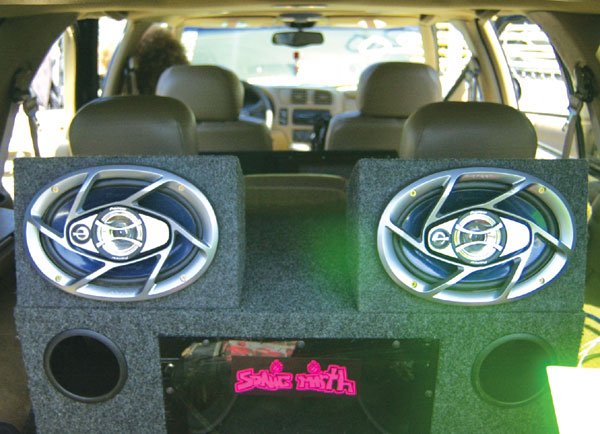Gilroy
– There are some cars in Gilroy that can be heard, or even felt,
before they are seen.
Called
”
boom cars
”
by critics, they can become both a quality-of-life and public
safety hazard, and in some cases, can cost their driver a
ticket.
By Lori Stuenkel
Gilroy – There are some cars in Gilroy that can be heard, or even felt, before they are seen.
Called “boom cars” by critics, they can become both a quality-of-life and public safety hazard, and in some cases, can cost their driver a ticket.
Technically, any driver whose car stereo is audible from 50 feet or more can be issued a citation by police.
“Windows up or down, you cannot have your stereo audible from 50 feet,” Gilroy Police Department Sgt. Kurt Svardal said.
The California Vehicle Code Section 27007 says this applies “when the vehicle is being operated upon a highway, unless that system is being operated to request assistance or warn of a hazardous situation.”
How the rule is applied in the city is often “circumstantial,” Svardal said.
“A lot of people don’t realize 50 feet is not that far,” he said.
On a street like First, with two lanes in each direction, 50 feet could be the distance from one side of the street to another. If an officer hears a stereo, say, from a convertible with the top down across the street, he or she may issue a warning rather than a ticket.
“But if, from a completely different intersection, you can hear a vehicle, that’s primarily what (the code) is used for,” Svardal said. “It is absolutely something that we stop cars and write tickets for, because it’s a hazard.”
Most places in America have noise laws on the books to keep sound at a minimum and some cities are tightening those laws in response to concern from citizens who say they are constantly bombarded with noise.
The $94 ticket for first or repeat offenses in Gilroy may seem lenient compared to laws elsewhere: Police in Lorain, Ohio, last year began smashing noisy stereos with sledgehammers, enforcing a law that says stereos must be confiscated on a second offense.
The East Bay city of Richmond last month imposed higher fines and harsher penalties – including impounding vehicles for up to one month – for vehicles audible more than 25 feet away.
Groups that seek to galvanize fellow boom car critics can easily be found online, encouraging citizens to report problems to police or petition city leaders to impose new laws.
“It’s a quality-of-life and a safety issue,” Svardal said. “If an officer is driving down the road with their lights and sirens, and nobody can hear them because this music is too loud, absolutely it is a problem.”
Residents often complain of boom cars driving through residential neighborhoods, he said. Some noisy offenders may be cited with disturbing the peace in certain instances, if it is a regular problem.
Research shows exposure to sound waves that rattle the bones can be a health hazard. Loud noise can cause people to react with anxiety and irritability, causing a faster pulse and higher blood pressure.
Excess noise exposure is the no. 1 cause of hearing loss, according to the American Hearing Research Foundation.
A normal conversation registers about 60 decibels, which is also the noise level of a sewing machine or typewriter. Continual exposure to more than 85 decibels – a bit quieter than the volume of a lawn mower – can cause permanent hearing damage, experts believe.
A lawnmower is about 90 decibels, while a rock concert is about 120 – a level that is only recommended for 15 minutes of exposure without protection. Car stereos can register above 154 decibels.
With the weather growing warmer and drivers spending more time on the road, more attention may be focused on boom cars, although that’s not necessarily because the boomers come out in the nice weather.
“It’s probably more prevalent in the summer because people keep their windows down … but some of the bumping cars – the cars you feel before they get there – those are around all the time,” Svardal said.
To report a noise complaint, contact Gilroy police at 846-0350.













